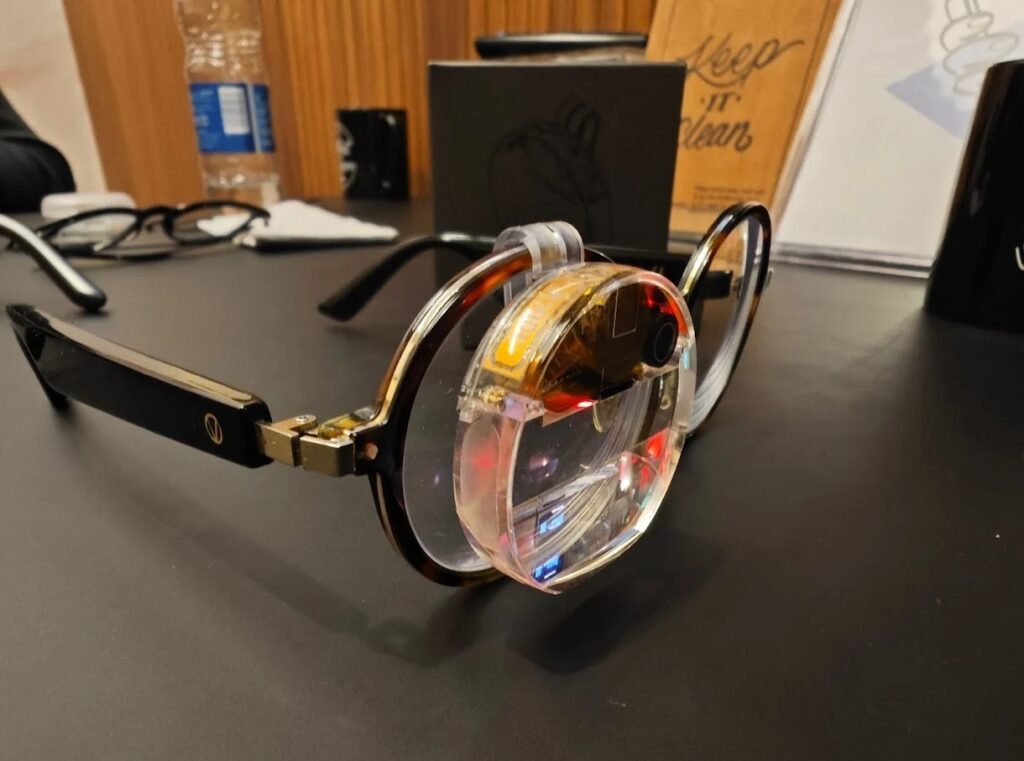The world of augmented reality (AR) just got a major shot in the arm with the news that Niantic founder John Hanke has invested in Brilliant Labs, a company developing AR glasses with multimodal AI capabilities. This has sparked excitement and questions within the tech community. Let’s delve into the details and explore the potential implications.
What Exactly are These AI-Powered AR Glasses?
Brilliant Labs’ creation, aptly named “Frame,” boasts several innovative features:
- Multimodal AI: It integrates various AI models for tasks like real-time translation, object recognition, and personalized information overlays. Imagine holding a conversation with someone speaking a different language, seeing translated captions appear within your glasses, or having relevant information displayed while looking at a landmark.
- Lightweight Design: Frame prioritizes comfort with a sleek and lightweight design, aiming to avoid the bulky stigma associated with earlier AR headsets. At just 75g, it’s designed for all-day wearability.
- Accessibility: Priced at $349, it falls within a more accessible range compared to some high-end AR options that can cost thousands. This makes the technology more attainable.

Core Tech Specs of Frame AR Glasses
- Weighs only 75g for comfortable all-day wear
- Camera-free design using spatial mapping sensors
- Dual 1080p stereoscopic displays
- 6-axis IMU head-tracking
- Customized Qualcomm Snapdragon processor
- Built-in microphone and speakers
- Touchpad input on right temple
- All-day battery life
Why the Pokemon Go Founder’s Investment Matters
John Hanke’s involvement brings significant credibility to Brilliant Labs. His success with Pokemon Go demonstrates his understanding of immersive technologies and their potential to engage users with real-world experiences.
His investment signals confidence in the potential of Frame and could attract further interest from investors and developers. Having an established industry leader on board lends legitimacy.
Hanke’s gaming background also suggests Frame’s capabilities for creating hybrid virtual/real world entertainment experiences. This could spark creativity in gaming and other applications.
The Most Promising Aspects of AI-Powered AR Glasses
Frame’s integration of AI into a lightweight AR form factor could open up some game-changing consumer and enterprise applications:
Enhanced Communication and Information Access
Imagine seamless language translation, real-time information about your surroundings, and personalized assistance overlaid on your vision. This could revolutionize travel, education, and daily interactions.
Next-Generation Gaming and Entertainment
Pokemon Go gave a taste of bringing virtual characters into a real space. Frame could take that to the next level with fully immersive AR gameplay and entertainment built around your immediate surroundings.
Accessibility Tools
AI features like object recognition and text-to-speech could significantly aid visually impaired or language-barriered individuals. Frame could make navigating the world much more accessible.
Professional Productivity
Doctors, engineers, construction workers and other professionals could leverage Frame’s AI capabilities to increase productivity, collaboration and work quality.
Concerns and Challenges Facing AR Glasses
While exciting, AR glasses face hurdles and skepticism that companies must thoughtfully address:
Privacy Concerns
Integrating cameras and AI into AR glasses raises concerns about data collection, privacy, and potential misuse of information. Transparency and robust security are crucial.
Ethical Considerations
Overlaying information and features onto a person’s view requires careful forethought about potential dangers like distraction or manipulation.
Adoption Hesitation
After lackluster adoption of Google Glass, consumers may be wary of wearing and sharing data through AR glasses. Building trust is key.
Technical Limitations
There are still technical barriers like limited battery life, processor constraints, and seamless UX refinements to work through.

Responsible Development Required
For AR glasses to gain wide acceptance, companies must prioritize:
- Security and privacy safeguards for user data
- Thoughtful design that minimizes distraction risk
- Transparency around capabilities to build consumer trust
- Inclusive design accessible to diverse groups
- Strict ethics review of use cases
The Verdict on AI-Powered AR Glasses
It’s too early to declare AR glasses like Frame a guaranteed game changer or a risky bet. The technology holds immense potential but still needs to earn people’s trust.
With responsible development and compelling use cases, AR glasses could one day seamlessly augment our lives with information and experiences. But companies must take a measured, ethical approach to building this new computing paradigm.
What do you think? Share your hopes and concerns about augmented reality glasses in the comments!










Add Comment